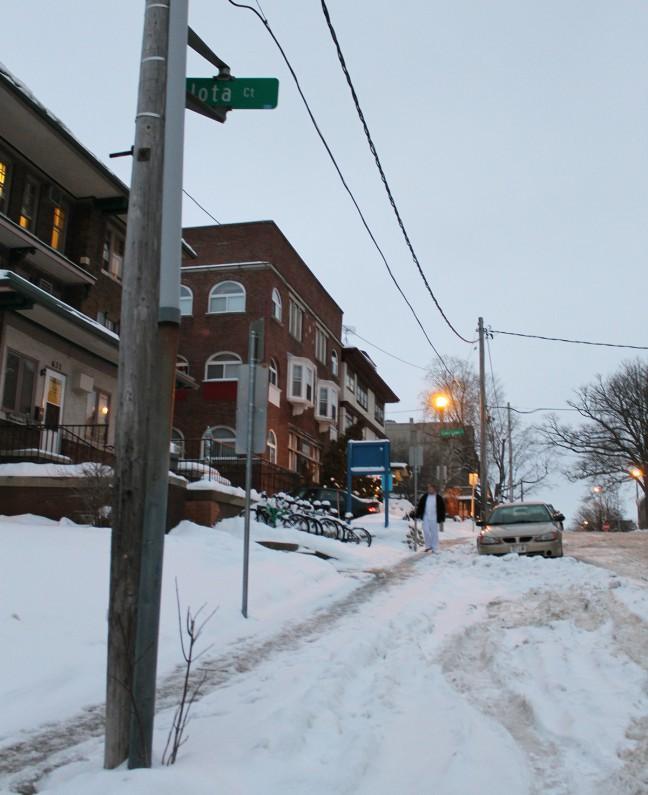Mayor Satya Rhodes-Conway and Madison alderpersons’ proposed legislation to simplify access to accessory dwelling units in Madison.
Accessory dwelling units, called ADUs, are independent housing units built on the same lot as single-family homes, according to the City of Madison. These take form as backyard cottages on the same property as another house.
Currently, the City of Madison Plan Commission’s zoning requirements make it difficult to get the permission required to construct an ADU, District 2 Ald. Patrick Heck said.
In each zoning category, land may only be used in certain ways, according to Axley Attorneys.
While a permitted use is allowed as long as a landowner meets the conditions required by the zoning category, a conditional use is subject to additional requirements, according to Axley Attorneys.
But the new proposal aims to increase housing in Madison by making the construction of ADUs permitted rather than conditional, Heck said, which will ease the process.
This change aims to ensure Madison residents and developers don’t have the difficulty that currently comes with ADUs, Heck said.
“The primary purpose is to make it easier for people to build accessory dwelling units,” Heck said. “Currently, they have to go to the Plan Commission and that adds a layer of both subjectivity from the Plan Commission as well as extra cost and unpredictability.”
ADUs can be converted portions of homes, additions to homes or stand-alone structures, according to the American Association of Retired Persons. Inside, they usually look like miniature homes, containing a kitchen, a bathroom and a bedroom, according to the League of Wisconsin Municipalities.
The proposal will allow the ADUs to be larger, according to the City of Madison. It will expand the maximum ADU area per lot and increase the maximum size of an ADU from 700 to 900 square feet, according to the City of Madison.
The new proposal could also make individual ADUs less expensive to construct and live in, Heck said.
“Right now, ADUs are not inexpensive to build,” Heck said. “They can be quite pricey. By making it a permitted use, that makes it a little more accessible and affordable.”
The mayor and supporting alderpersons’ aim for ADUs to be available to everyone, even though they are relatively expensive to build at the moment, Heck said.
To counteract the expense, the sponsors proposed a plan to create a program to provide lower-income people with low-interest loans, Heck said.
For example, single-family homes will be able to profit from ADUs, generating income while supplying housing, Heck said.
“We don’t want it to be just for well-to-do people,” Heck said.
By making it easier and less expensive to construct ADUs, the new proposal will expand housing opportunities in Madison, Heck said.
Increased housing options for homebuyers and extra revenue for property owners have been the biggest benefits of ADUs, according to Architectural Digest. Parcels with higher-value homes saw more ADU construction, according to an investigation by UC Irvine. The study found adding an ADU can increase the value of the property by 50%.
Several thousand people attend Mifflin Block Party despite COVID-19 restrictions
Though the proposal would likely not address housing issues on the University of Wisconsin campus. For UW students, the likelihood of living in an ADU is lower, Director of Marketing and Communications for University Housing Brendon Dybdahl said.
The new proposal will not impact University Residence Halls or University Apartments, Dybdahl said.
“The proposed legislation only allows for ADUs on owner-occupied properties with single-family homes so it would not be relevant to our on-campus housing,” Dybdahl said. “We can’t speculate on how that might impact private housing or the overall Madison housing market but there are very few single-family homes in the immediate campus area.”
ADUs could present challenges for Madison residents. For example, people might be unhappy with increased construction in residential areas or unsatisfied with their new neighbors, Heck said.
Other opponents have argued that ADUs will disrupt neighborhood peace with overcrowding, noise issues, parking disputes or the elimination of single-family districts, according to the League of Wisconsin Municipalities.
Others contend renting ADUs could introduce a transient resident population that will interfere with neighborhood stability and bring in suspicious individuals, according to the League of Wisconsin Municipalities.
With Blank leaving, here is what we need in our next chancellor
“It’s more important to build more housing than to keep neighborhoods static,” Heck said.
The presentation of proposed changes with the Planning Commission happened on Nov. 8, according to the City of Madison. A public comment opportunity is planned for a Planning Commission meeting on Nov. 22.
A vote on the proposal by city council is scheduled for Dec. 7.
The mayor and supporting alderpersons’ anticipate that the program will be approved and enacted within the year, Heck said.


